The music of Haiti combines a wide range of influences drawn from the diverse population that has settled on this Caribbean island. It often has hints of French, African rhythms, Spanish elements and others who have inhabited the island of Hispaniola and minor native Taino influences. Styles of music unique to the nation of Haiti include music derived from rara parading music, twoubadou ballads, mini-jazz rock bands, rasin movement, hip hop Creòle, the wildly popular compas, and méringue as its basic rhythm. Haitian music is influenced mostly by European colonial ties and African migration. In the case of European colonization, musical influence has derived primarily from the French.
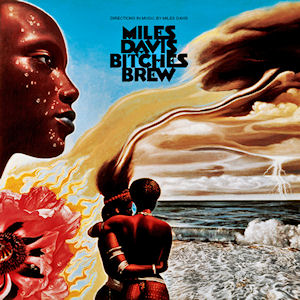
Bitches Brew is a studio album by American jazz trumpeter, composer, and bandleader Miles Davis. It was recorded from August 19 to 21, 1969, at Columbia's Studio B in New York City and released on March 30, 1970, by Columbia Records. It marked his continuing experimentation with electric instruments that he had featured on his previous record, the critically acclaimed In a Silent Way (1969). With these instruments, such as the electric piano and guitar, Davis departed from traditional jazz rhythms in favor of loose, rock-influenced arrangements based on improvisation. The final tracks were edited and pieced together by producer Teo Macero.

Katy Lied is the fourth studio album by American rock band Steely Dan, released by ABC Records in March 1975; reissues have been released by MCA Records since ABC Records was acquired by MCA in 1979. It was the first album the group made after they stopped touring, as well as their first to feature backing vocals by Michael McDonald.

Beggars Banquet is a studio album by the English rock band the Rolling Stones, released on 6 December 1968 by Decca Records in the United Kingdom and London Records in the United States. It was the first Rolling Stones album produced by Jimmy Miller, whose production work formed a key aspect of the group's sound throughout the late 1960s and early 1970s.
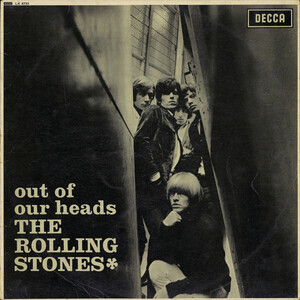
Out of Our Heads is a 1965 album by the English rock band the Rolling Stones, released in two editions with different covers and track listings. In the US, London Records released it on 30 July 1965 as the band's fourth American album, while Decca Records released its UK edition on 24 September 1965 as the third British album.

Boukman Eksperyans is a mizik rasin band from the city of Port-au-Prince, Haiti, Grammy nominated for their debut album Vodou Adjae. The band derives its name from Dutty Boukman, a vodou priest who led a religious ceremony in 1791 that is widely considered the start of the Haitian Revolution. The other half of the band's name, "Eksperyans", is the Haitian Creole word for "experience", and was inspired by the band's appreciation of the music of Jimi Hendrix. The band was at the height of its popularity in 1991 when the presidency of Jean Bertrand Aristide was overthrown in a military coup d'etat. Like many other artists and performers, Boukman Eksperyans fled the country to live in exile. During their time abroad, the band performed and spoke out against the military dictatorship of Raoul Cédras. In 1994, after Aristide was restored to power, the band returned to Haiti, where they continued to play concerts, record albums, and perform at the Carnival celebrations.

Get Up with It is an album by American jazz trumpeter, bandleader, and composer Miles Davis. Released by Columbia Records on November 22, 1974, it compiled songs Davis had recorded in sessions between 1970 and 1974, including those for the studio albums Jack Johnson (1971) and On the Corner (1972). In The Rolling Stone Album Guide (2004), J. D. Considine described the compilation's music as "worldbeat fusion".

Play Me Backwards is an album by the American musician Joan Baez, released in 1992. The album was nominated for a Grammy for Best Contemporary Folk Recording. Baez supported it with an international tour.
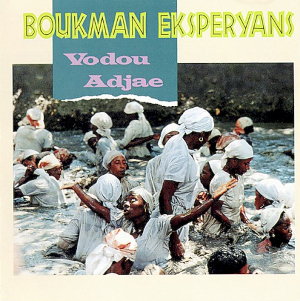
Vodou Adjae is the first album of the Haitian music group Boukman Eksperyans. It is distributed in the United States and Canada by Mango, a division of Island Records. All of the songs are in Haitian Creole.
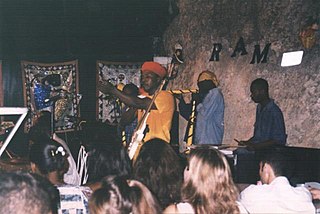
RAM is a mizik rasin band based in the city of Port-au-Prince, Haiti. The band derives its name from the initials of its founder, songwriter, and lead male vocalist, Richard A. Morse. The band's music has been described by Morse as "Vodou rock 'n' roots", and has been one of the prominent bands in the mizik rasin musical movement in Haiti. RAM began performing together in 1990, and recorded their first album in 1996. The band's music incorporates traditional Vodou lyrics and instruments, such as rara horns and petro drums, into modern rock and roll. The band's songs include lyrics in Haitian Creole, French, and English.
Rasin, also known as Haitian roots music, is a musical style that began in Haiti in the 1970s when musicians began combining elements of traditional Haitian Vodou ceremonial and folkloric music with various musical styles. The late 20th century style of this music links to the roots of Vodou tradition, where it came to be known as mizik rasin later in Haitian Creole. Modern-day, the movement is often referred to simply as "rasin" or "racine".

Scatterlings is a studio album by Juluka, a South African band led by Johnny Clegg and Sipho Mchunu. It was released in 1982.
Richard Auguste Morse is a Puerto-Rican-born Haitian-American musician and hotel manager currently residing in Port-au-Prince, Haiti. Morse manages the Hotel Oloffson, and is the founder of a mizik rasin band, RAM, named after his initials. Morse is married to the band's lead female vocalist, Lunise Morse, and has two children. Morse and his band are famous in Haiti for their political songs and performances critical of the Raoul Cédras military junta from 1991 to 1994. In the early 2000s, Morse has also criticized Jean-Bertrand Aristide and Fanmi Lavalas through his music. Morse is a United States citizen. His cousin Michel Martelly is a musician, right-wing Haitian politician and former President of Haiti. Richard Morse repeatedly expressed support for Martelly in the 2010 presidential elections in Haiti. By the end of 2012, he had distanced himself from the Martelly government.
Eddy François is a Haitian musician,

Élan is the third album by the American band Firefall, released in 1978. It featured the single "Strange Way" which reached No. 11 on the Billboard Hot 100 and #24 on the Adult Contemporary chart.

Toots in Memphis is an album by the Jamaican musician Toots Hibbert. Released in 1988, Toots in Memphis was recorded without the Maytals. The majority of the album's tracks are covers of American R&B songs.
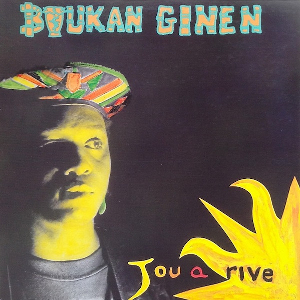
Jou a Rive is the debut album by the Haitian band Boukan Ginen, released in 1995. It was originally released in Haiti in 1993. Most of the lyrics were sung in Creole.

Sol Negro is the debut album by the Brazilian musician Virginia Rodrigues. It was released in 1997.

Two Worlds One Heart is an album by the South African choral group Ladysmith Black Mambazo, released in 1990. The first single was "Township Jive", which the group had performed on the Graceland tour.
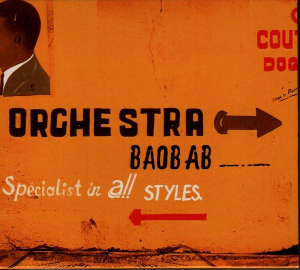
Specialist in All Styles is an album by the Senegalese band Orchestra Baobab, released in 2002. After the success of the Pirates Choice reissue, the band decided to record a reunion album. It was Orchestra Baobab's first album in 15 years. The album title was taken from a sign hanging outside a barbershop.
















